How much time per day is enough to make progress in music
I keep it simple: set clear weekly goals that match my skill level, split practice into short focused chunks, always start with warmups, use a timer, track by piece, and tweak the plan weekly. Quality over quantity — rest when sore, celebrate small wins, and keep it consistent.
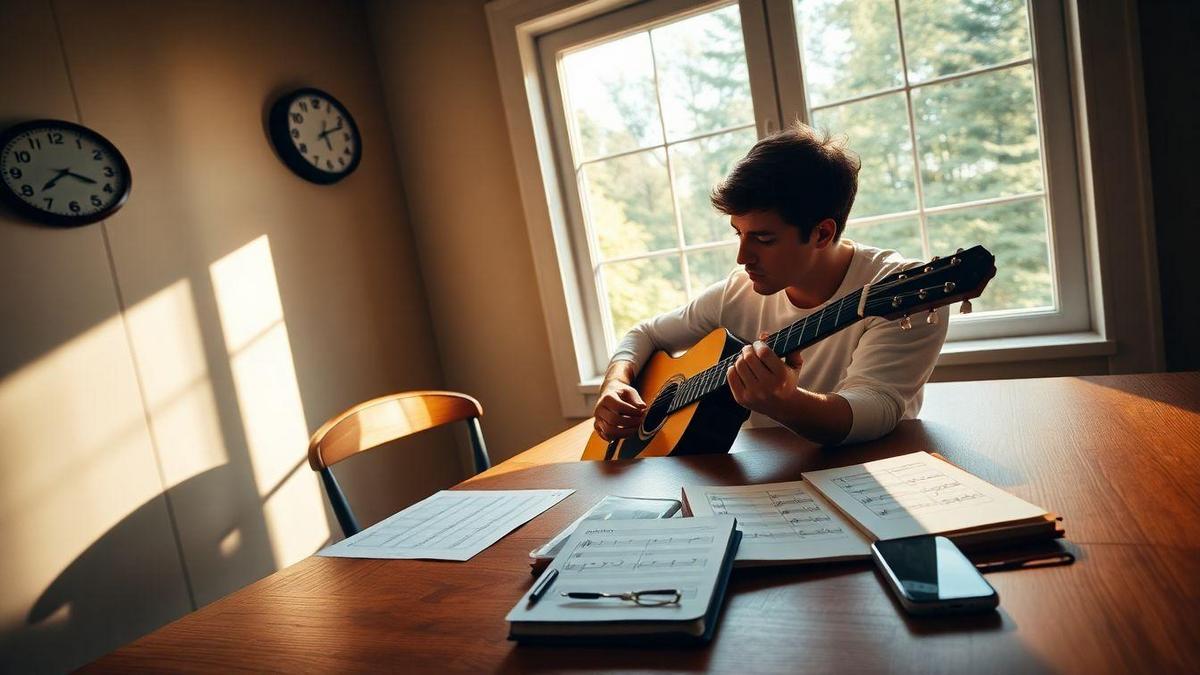
Key takeaway
- Short, regular practice beats occasional marathons. See the benefits of focused daily sessions in the power of just twenty minutes daily.
- Focused, tiny goals move the needle.
- Warmups protect body and voice — basic scales and long tones matter (scales explained in plain English).
- Track progress and adjust weekly — build a routine with simple steps (how to create a simple practice routine).
- Rest prevents burnout.
How I decide “How much time per day is enough to make progress in music”
I treat the question “How much time per day is enough to make progress in music?” like an experiment: say it out loud, write a small plan, then test it. deliberate practice and skill development shows focused, structured practice predicts long-term improvement. Steady, focused minutes beat long, distracted hours. Think of practice like watering a plant — small, regular sips grow roots better than one big flood.
Set clear weekly goals to guide daily practice time
- Pick one main weekly goal (e.g., learn a 4-bar riff, master a chord change).
- Break it into daily tasks: warm-up, focused practice, short review. For structure and accountability, follow the simple steps in how to create a simple practice routine.
- Choose a daily time that fits the goal: small goals = 20–30 minutes; bigger goals = more.
- Put the plan where you’ll see it (phone note, paper list) and mark tasks off.
Ordered steps:
- Choose one clear weekly goal.
- Split it into 3 daily tasks.
- Assign a short, focused daily time block.
- Practice daily and mark progress.
Match goals to skill level — how many hours should I practice music per day?
Be honest about your level and set time accordingly. If you’ve asked How much time per day is enough to make progress in music?, use this as a rough guide:
| Skill Level | Typical Weekly Focus | Suggested Daily Time |
|---|---|---|
| Beginner | Posture, basic rhythms, simple chords | 20–30 min |
| Intermediate | Technique, small songs, timing | 30–60 min |
| Advanced | Complex pieces, improvisation, performance prep | 60–120 min |
If you’re still choosing which instrument to commit to, resources like guitar, keyboard, or drums — which fits your style and how to choose your first instrument without regrets can help. Watch for fatigue. If hands or brain feel fried, cut time or change tasks. Small, concentrated sessions beat long scattered ones.
Review weekly and adjust minutes
- Each week, ask: Did I move toward the goal? What helped?
- Track small wins (clean bar, smoother transition) and adjust time by 10–20% rather than huge jumps.
- Celebrate one win and set the next week’s goal.
I once bumped guitar practice from 20 to 30 minutes after steady gains — a small change that avoided burnout and improved chops.
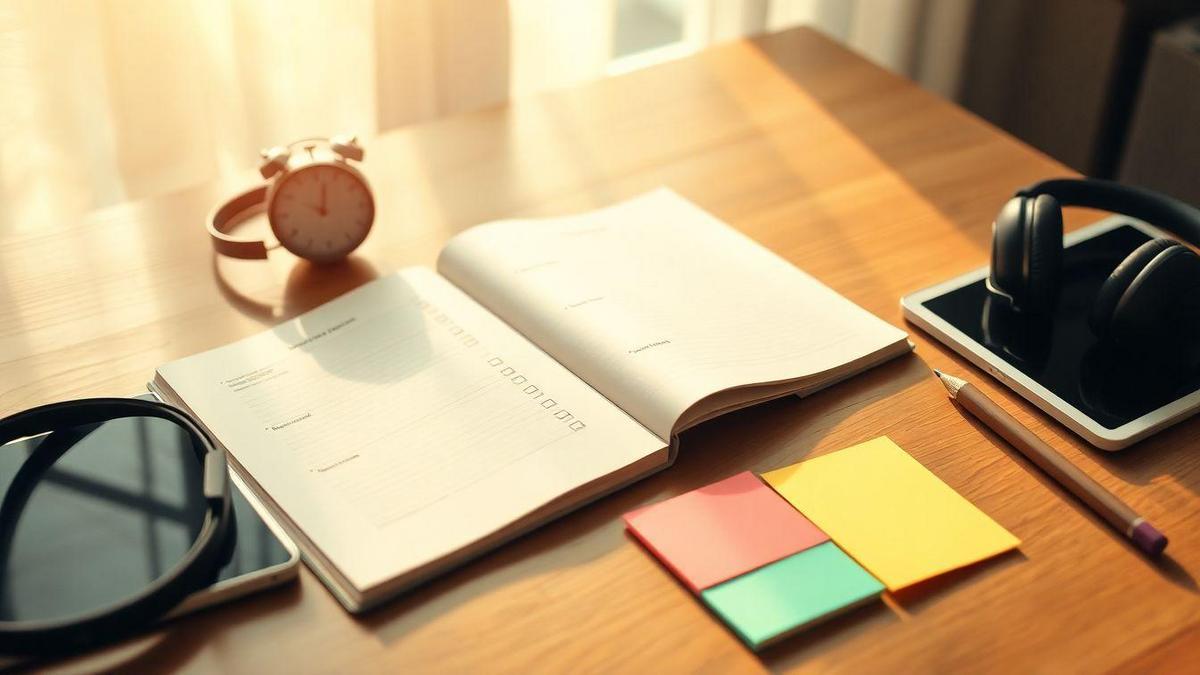
How I split practice into focused chunks for steady progress
I treat each block like a mini-mission: one goal, one win.
Warmups (5–15 minutes)
- Always start with warmups: stretches, slow scales, long tones, humming. For practical warmup ideas and why they work, see scales explained in plain English.
- Quick checklist: shake joints (30–60s), slow scales/tones (3–8 min), light drills (2–5 min).
Result: cleaner playing and fewer injuries.
Short focused sessions (10–20 minutes each)
Typical layout:
- Scales/technique — 10–15 min (slow, even tone) — build this from the same simple concepts in scales explained.
- Repertoire — 15–25 min (work small sections, then link).
- Sight reading — 10 min (keep flow) — basic reading tips are available at how to read chords and sheet music.
- Play for fun — 5–10 min (end on something enjoyable).
If you’re wondering “How much time per day is enough to make progress in music?” — start small and be regular. Thirty focused minutes daily beats a random three-hour cram.
Use a timer and stick to segments
- Set a timer per block, work with no phone, take short breaks (1–3 min) between blocks. For help staying consistent, try strategies from how to stop procrastinating on music practice.
- Tools: phone timer, kitchen timer, Pomodoro app.
How I choose practice length as a beginner (piano example)
For piano beginners I aim for 20–45 minutes daily. It’s long enough to progress and short enough to keep focus.
Session split examples:
- 20 min: 5 min warm-up / 10 min main work / 5 min technique/sight-reading
- 30 min: 5 min warm-up / 20 min main work / 5 min technique
- 45 min: 5 min warm-up / 30 min main work / 10 min technique
Add small time increments (10–15 min) for tricky pieces. One full rest day per week helps recovery. Signs of fatigue (stiff fingers, sloppy timing, dread) mean shorten or change focus. For clinical resources on preventing injuries and overuse in musicians, check guidance on safe practice loads and injury prevention.
Track practice by piece and focus
Keep a simple log: date, piece, focus, time, next goal. Example entries help define next steps (e.g., clean 8 bars at 60 BPM). Weekly reviews move stubborn spots into warm-ups.
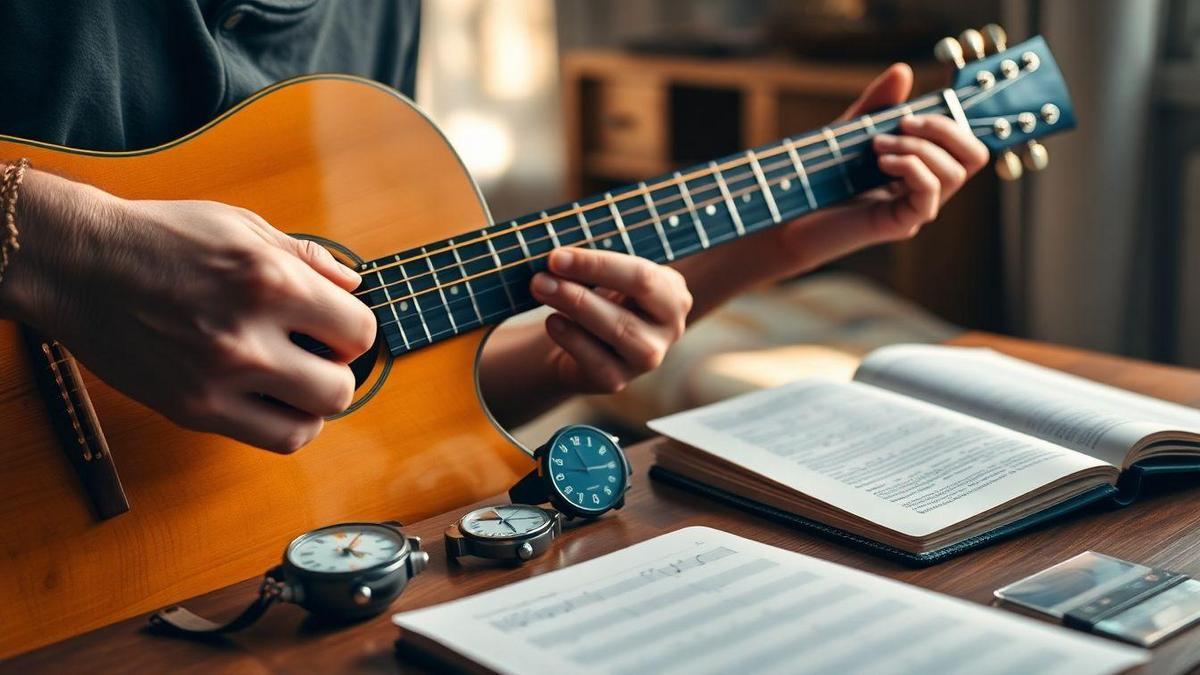
How I set effective daily practice time for guitar
When I asked “How much time per day is enough to make progress in music?” I learned the answer depends on what I do with the time. I pick a daily length I can keep for weeks — often 30–60 minutes — and use purposeful structure.
Session example:
- Warm-up 5–10 min.
- Chords 10–15 min (see basic chord concepts in what chords are and why they matter).
- Technique 10–15 min.
- Songs 10–20 min.
Short focused repeats beat long sloppy runs. For guitar, balance rhythm and lead (short sessions: 60/40 rhythm/lead; longer sessions: 50/50). Record a quick take weekly for honest feedback.
When acquiring gear, consider budget options like 5 affordable instruments perfect for beginners or whether to rent with renting vs buying.
Adjust based on soreness and progress:
- If sore: drop to 15–20 min, gentle work.
- If stuck: two 10-min bursts.
- If improving: add 5–10 min to the weak area.

How I decide how long to practice singing each day
Treat the voice like a plant — it grows with care, not force. See vocal health and warmup guidance for hydration, rest, and signs to stop practicing. Ask: Am I improving without pain? If yes, continue; if no, stop and adjust.
Typical vocal session:
- Warm-up 5–10 min (humming, lip trills).
- Focused technique 10–20 min (pitch, breath, vowels — the harder slot).
- Cool-down 2–5 min (soft slides, hums).
For beginners asking “How much time per day is enough to make progress in music?”, my honest answer: 20–45 minutes of focused, consistent work moves the needle. If you only have 10 minutes, use it for warm-up plus one technical goal. Increase by 5–10 minutes per week if healthy.
Include vocal rest and hydration: sip room-temp water, avoid yelling/whispering, take full vocal rest days when hoarse. For expressive technique and adding feeling to lines, check how to add emotion to every note and pair that with gentle, regular warmups.

How I coach kids: How much time should kids spend on music daily?
I answer the core question: “How much time per day is enough to make progress in music?” with consistency and fun. Short, daily habits beat long sessions.
Recommendations:
- Ages 4–8: 10–20 min/day.
- Ages 9–12: 15–30 min/day.
- Add one longer weekly session (30–45 min).
Keep practice playful: timers with music, sticker charts, choice-driven practice, and praise effort. Ideas to make it enjoyable are covered in making practice fun instead of a chore. Celebrate tiny wins and record short clips to show progress.

How I use daily listening to boost practice
Set aside 10–30 minutes of active listening: pick one song and study structure and rhythm. Pair listening with humming or tapping to train ear and memory. Note one thing to apply in practice the next day (e.g., chorus syncopation — practice tapping 2 & 4). Active listening also pairs well with basic harmony and theory — is music theory really that scary? helps demystify useful ideas.

Balance quality and daily practice hours to avoid burnout
More time without focus leads to burnout. Short, focused sessions beat long fuzzy hours. For many beginners, 20–60 minutes daily is effective; advanced players often split 1–2 hours into blocks.
Principles of deliberate practice:
- One clear goal per session.
- Work hardest bits first.
- Slow practice until clean.
- Use focused repetition (short runs, correct each time).
- Record or get feedback.
If you worry whether practice really matters more than talent, read talent vs practice — can anyone learn music?. For motivation during slow phases try ideas from staying motivated when progress feels slow.
Schedule breaks and sleep: short breaks every 20–45 minutes and good sleep help consolidation. Measure progress by skill gains, not clock hours — play clean at tempo, fewer mistakes, better sight-reading, and relaxed performance.
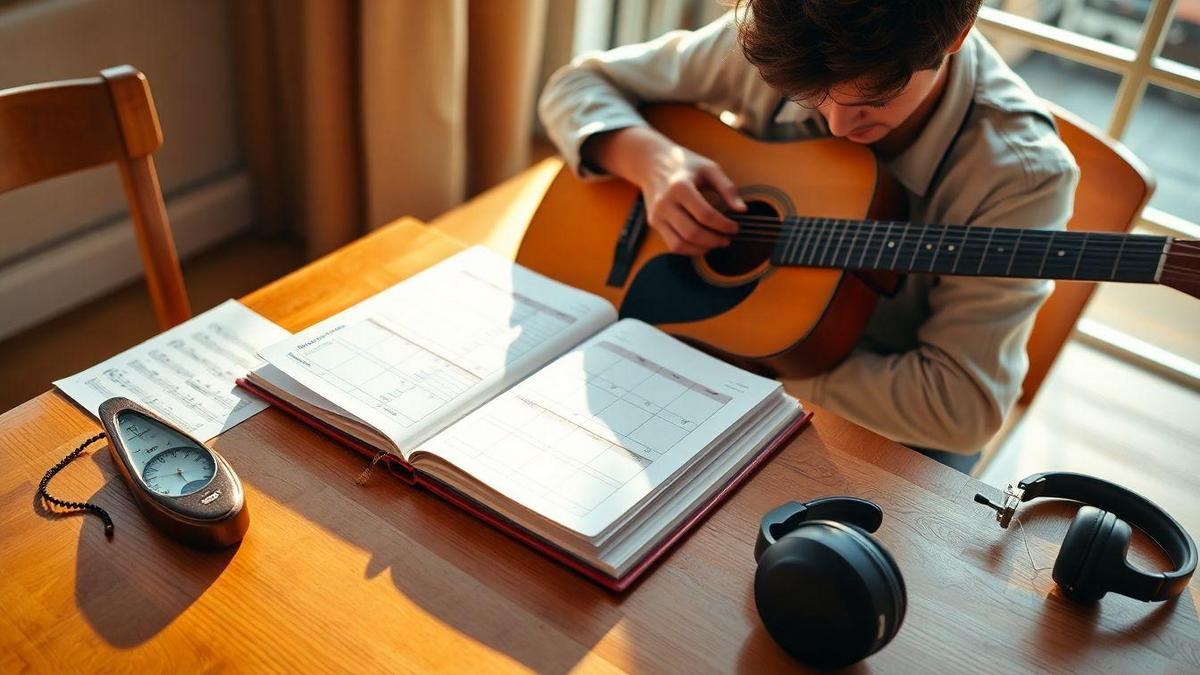
Building an optimal practice schedule — how many hours should I practice music per day?
What fits your life is the best plan. Recommendations:
- Absolute beginner: 20–30 min/day (basics, simple songs).
- Early intermediate: 45–60 min/day (technique, pieces).
- Advanced/audition prep: 90–120 min/day split into blocks.
Daily routine template:
- Warm-up (5–10 min).
- Focused work (10–40 min).
- Play for fun (5–10 min).
- Reflection (1–2 min).
Use logs, apps, or a practice journal. Record date, time practiced, what you worked on, one win, and one next step. Review monthly and tweak. Practical monthly tweaks and small experiments are explained in the power of just twenty minutes daily and the routine guide at how to create a simple practice routine.
Monthly review checklist:
- Total minutes this month.
- Skills improved vs stuck.
- Missed days and why.
- One change to try next month.
Small monthly tweaks keep progress steady.
Conclusion
If you’re asking “How much time per day is enough to make progress in music?”, the short, practical answer is: regular, focused practice — even just 20–45 minutes for most beginners — beats irregular long sessions. Warm up, pick tiny goals, use a timer, track progress, rest when needed, and measure gains by skill, not hours. Keep it small, kind, and consistent.
For more tips and guides, visit https://clickneutro.com.
Frequently asked questions
How much time per day is enough to make progress in music?
For most beginners, 20–45 minutes of focused, consistent practice daily moves the needle. Push to 45–60 minutes for steady intermediate gains and 1–2 hours split into blocks for advanced goals.
Is daily short practice better than long once-a-week sessions?
Yes. Short daily reps keep skills fresh, speed learning, and reduce burnout — a principle reinforced in the power of twenty-minute daily sessions.
How should I split my practice time each day?
Warm up first (5–10 min), work hardest bits next, then spend remaining time on repertoire, technique, sight-reading, and end with a short fun play session. Keep each block focused and timed; for structure see how to create a simple practice routine.
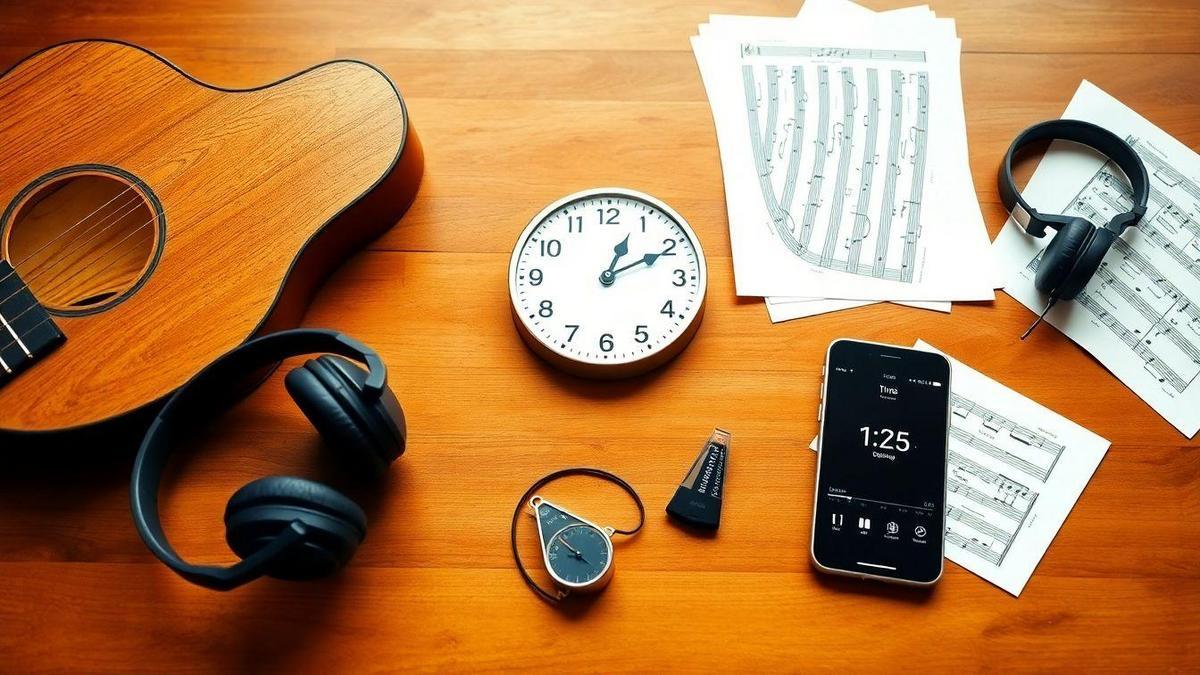
3 comentários em “How much time per day for music”